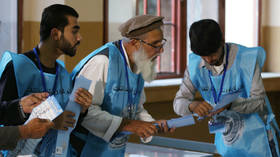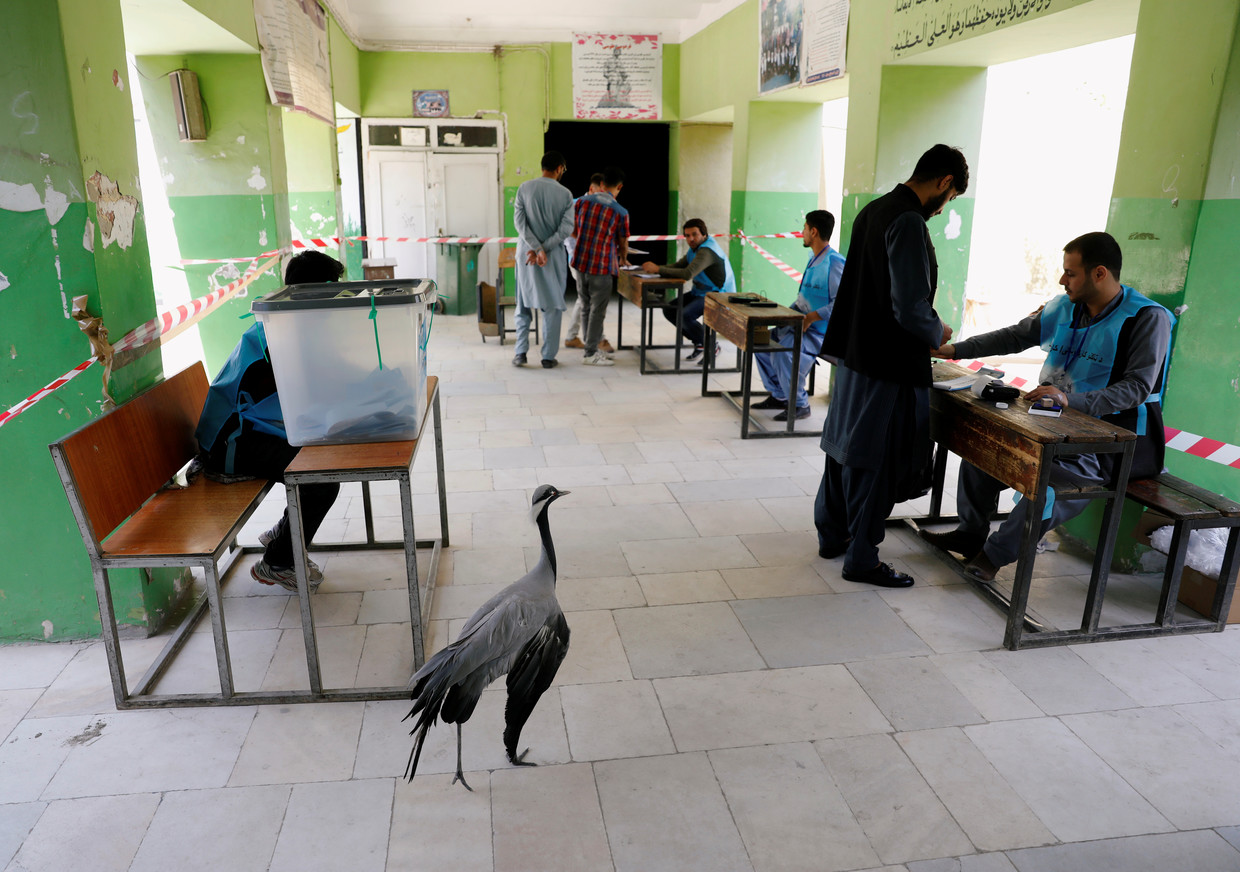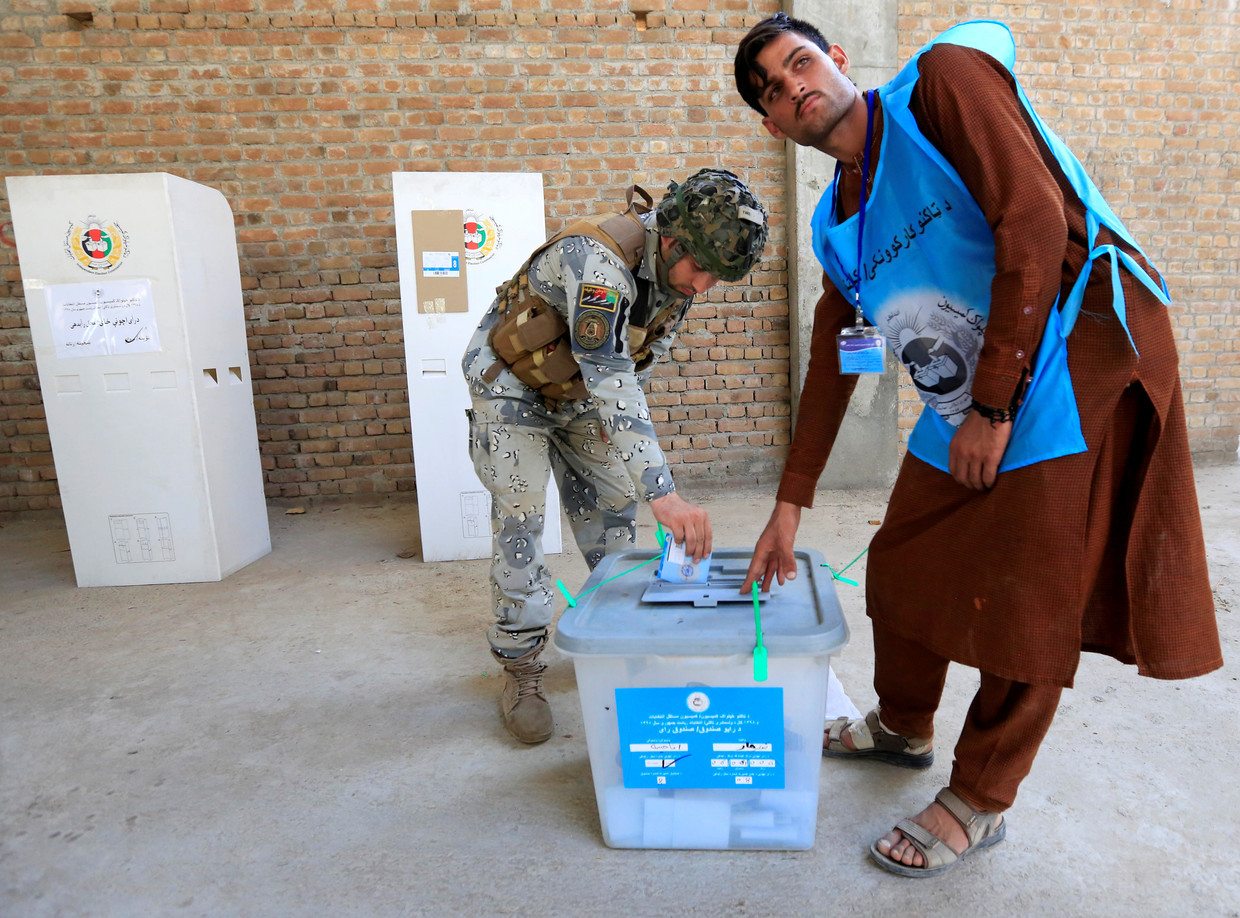https://www.rt.com/news/469849-afghanistan-election-low-turnout/
news by installing RT’s extension for Chrome. Never miss a story with this clean and simple app that delivers the latest headlines to you.
RT
LIVE
HomeWorld News
Afghanistan presidential vote shows low turnout after technical glitches & violence in wake of US-Taliban talks collapse
Published time: 28 Sep, 2019 19:39Edited time: 29 Sep, 2019 09:54

Afghan election commission workers count ballot papers of the presidential election in Kabul, Afghanistan on September 28, 2019. © Reuters / Omar Sobhani

The presidential election in Afghanistan has been marred by violence that has followed the collapse of the US-Taliban peace talks, as well as numerous technical issues. The voter turnout is described by observers as low.
The polls were held in the war-torn country on Saturday. The elections had originally been scheduled for April 20, yet were delayed twice over technical setbacks and changes in election laws. The voters were choosing from among 18 candidates, including the country’s incumbent president, Ashraf Ghani.
The vote count will take weeks, with the preliminary results expected not earlier than mid-October.
Reports indicate the voting process was not smooth – some 500 polling stations failed to open for various reasons, including lack of ballots. Apart from that, the country’s Independent Election Commission (IEC) said it had failed to establish contact with 901 of some 5,000 presumably functioning stations, for reasons as yet undisclosed.

A crane is seen during the presidential election in Kabul, Afghanistan on September 28, 2019. © Reuters / Mohammad Ismail
The election comes amid escalated fighting across the country between the US-backed government forces and the Taliban, that followed the collapse of the peace talks between the hardline Islamist group and Washington early in September. The Taliban warned the more than nine million registered voters to steer clear of the polling stations and threatened to attack the facilities.
Several suicide bombings occurred across the country during the day, including in the capital city of Kabul. A handful of polling stations were attacked by Taliban militants, who engaged in gun battles with government troops, disrupting the voting. At least one civilian and two law enforcement officers were killed, and at least 37 people were injured in the election day turmoil, according to the country’s defense ministry. None of the Taliban attacks have turned out to be large-scale so far, though.
ALSO ON RT.COMBlast occurs near polling station in Afghanistan as presidential elections get underway
The electoral process was also affected by various technical hiccups, ranging from poorly prepared voters lists to simple lack of ballots. The notorious German-made biometric devices – arguably the main perpetrators behind the 2018 parliamentary election chaos – were the source of numerous problems as well.

An Afghan policeman casts his vote in presidential election in Jalalabad. © Reuters / Parwiz
Implemented to prevent election fraud, such as ballot stuffing or repeat-voting, the devices prevented voting altogether on several occasions. They were seen denying access to certain voters, especially those who took part in the 2018 vote, the Transparent Election Foundation of Afghanistan has said, adding it might indicate that the memory cards in them had not been properly erased. Notably, the biometric devices have apparently shunned some women from the elections. The machines identify voters by their fingerprints and faces, yet many Afghani women, especially in rural areas, cover their faces in public and refuse to be photographed.
Despite the “partially secure polling environment,” voter turnout appears to be very low, the election foundation, which observed the elections in all 34 Afghani provinces, has said.
ALSO ON RT.COM‘We can fight Americans for 100 years,’ Taliban tells RT after scrapped peace talks
It’s the fourth time Afghanistan has held presidential elections since the 2001 US invasion of the country. The ongoing spike in violence follows the collapse of over year-long US-Taliban peace talks, called off by US President Donald Trump before any final agreement could be signed, under the pretext of a US serviceman’s death in a suicide blast. The militant group, which wants all US troops gone, insists it has the right to defend the country from the occupiers, and has already expressed readiness for further negotiations with Washington.
Moscow has recently said it is ready to help bring the Taliban and the Americans back to the negotiating table.
news by installing RT’s extension for Chrome. Never miss a story with this clean and simple app that delivers the latest headlines to you.
RT
LIVE
- search
- Menu mobile
HomeWorld News
Afghanistan presidential vote shows low turnout after technical glitches & violence in wake of US-Taliban talks collapse
Published time: 28 Sep, 2019 19:39Edited time: 29 Sep, 2019 09:54
Afghan election commission workers count ballot papers of the presidential election in Kabul, Afghanistan on September 28, 2019. © Reuters / Omar Sobhani
- 25

The presidential election in Afghanistan has been marred by violence that has followed the collapse of the US-Taliban peace talks, as well as numerous technical issues. The voter turnout is described by observers as low.
The polls were held in the war-torn country on Saturday. The elections had originally been scheduled for April 20, yet were delayed twice over technical setbacks and changes in election laws. The voters were choosing from among 18 candidates, including the country’s incumbent president, Ashraf Ghani.
The vote count will take weeks, with the preliminary results expected not earlier than mid-October.
Reports indicate the voting process was not smooth – some 500 polling stations failed to open for various reasons, including lack of ballots. Apart from that, the country’s Independent Election Commission (IEC) said it had failed to establish contact with 901 of some 5,000 presumably functioning stations, for reasons as yet undisclosed.
A crane is seen during the presidential election in Kabul, Afghanistan on September 28, 2019. © Reuters / Mohammad Ismail
The election comes amid escalated fighting across the country between the US-backed government forces and the Taliban, that followed the collapse of the peace talks between the hardline Islamist group and Washington early in September. The Taliban warned the more than nine million registered voters to steer clear of the polling stations and threatened to attack the facilities.
Several suicide bombings occurred across the country during the day, including in the capital city of Kabul. A handful of polling stations were attacked by Taliban militants, who engaged in gun battles with government troops, disrupting the voting. At least one civilian and two law enforcement officers were killed, and at least 37 people were injured in the election day turmoil, according to the country’s defense ministry. None of the Taliban attacks have turned out to be large-scale so far, though.
ALSO ON RT.COMBlast occurs near polling station in Afghanistan as presidential elections get underway
The electoral process was also affected by various technical hiccups, ranging from poorly prepared voters lists to simple lack of ballots. The notorious German-made biometric devices – arguably the main perpetrators behind the 2018 parliamentary election chaos – were the source of numerous problems as well.
An Afghan policeman casts his vote in presidential election in Jalalabad. © Reuters / Parwiz
Implemented to prevent election fraud, such as ballot stuffing or repeat-voting, the devices prevented voting altogether on several occasions. They were seen denying access to certain voters, especially those who took part in the 2018 vote, the Transparent Election Foundation of Afghanistan has said, adding it might indicate that the memory cards in them had not been properly erased. Notably, the biometric devices have apparently shunned some women from the elections. The machines identify voters by their fingerprints and faces, yet many Afghani women, especially in rural areas, cover their faces in public and refuse to be photographed.
Despite the “partially secure polling environment,” voter turnout appears to be very low, the election foundation, which observed the elections in all 34 Afghani provinces, has said.
ALSO ON RT.COM‘We can fight Americans for 100 years,’ Taliban tells RT after scrapped peace talks
It’s the fourth time Afghanistan has held presidential elections since the 2001 US invasion of the country. The ongoing spike in violence follows the collapse of over year-long US-Taliban peace talks, called off by US President Donald Trump before any final agreement could be signed, under the pretext of a US serviceman’s death in a suicide blast. The militant group, which wants all US troops gone, insists it has the right to defend the country from the occupiers, and has already expressed readiness for further negotiations with Washington.
Moscow has recently said it is ready to help bring the Taliban and the Americans back to the negotiating table.

